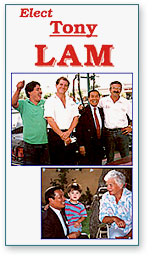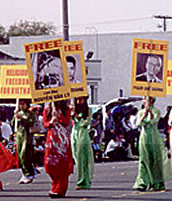|
 Southeast Asian Americans are increasingly registering to vote and participating
in local and national elections throughout the United States. Ethnic media and
ethnic community leaders play instrumental roles in influencing the political
viewpoints of their communities. In some cases, ethnic newspapers, radio, and
television translate ballot measures into ethnic languages and objectively inform
voters about upcoming political issues; in other cases, they deliberately sway
voter opinion. With the assistance of Asian American advocacy organizations, local
groups have helped provide election ballot materials in ethnic languages for the
newcomers who have gained citizenship. Southeast Asian Americans are increasingly registering to vote and participating
in local and national elections throughout the United States. Ethnic media and
ethnic community leaders play instrumental roles in influencing the political
viewpoints of their communities. In some cases, ethnic newspapers, radio, and
television translate ballot measures into ethnic languages and objectively inform
voters about upcoming political issues; in other cases, they deliberately sway
voter opinion. With the assistance of Asian American advocacy organizations, local
groups have helped provide election ballot materials in ethnic languages for the
newcomers who have gained citizenship.
Winning Elective Office
In addition to being appointed to political positions at the local,
state, and federal levels, Southeast Asian Americans started running
for, and winning, local offices in the 1990s. Most notably, these
include the Vietnamese in California and Texas, Cambodians in
Massachusetts, and Hmong in Minnesota. Some affiliate with the
Republican Party because of its anti-Communist stance and socially
conservative agenda, while others lean to the Democratic Party with its
civil rights platform and emphasis on social policies. Ethnic
politicians raise money not only within their local ethnic communities,
but also from ethnic fundraisers held in other cities and states.
For the most part, these politicians have won elections in sites with large
ethnic communities, although they are not always the ones casting the majority
of votes. In other words, they are winning elections because they have gained
popular support from mainstream voters. If this trend continues, more Southeast
Asians from both the Republican and Democratic parties will continue to run for
office and get more involved in electoral politics.
|


 Southeast Asian Americans are increasingly registering to vote and participating
in local and national elections throughout the United States. Ethnic media and
ethnic community leaders play instrumental roles in influencing the political
viewpoints of their communities. In some cases, ethnic newspapers, radio, and
television translate ballot measures into ethnic languages and objectively inform
voters about upcoming political issues; in other cases, they deliberately sway
voter opinion. With the assistance of Asian American advocacy organizations, local
groups have helped provide election ballot materials in ethnic languages for the
newcomers who have gained citizenship.
Southeast Asian Americans are increasingly registering to vote and participating
in local and national elections throughout the United States. Ethnic media and
ethnic community leaders play instrumental roles in influencing the political
viewpoints of their communities. In some cases, ethnic newspapers, radio, and
television translate ballot measures into ethnic languages and objectively inform
voters about upcoming political issues; in other cases, they deliberately sway
voter opinion. With the assistance of Asian American advocacy organizations, local
groups have helped provide election ballot materials in ethnic languages for the
newcomers who have gained citizenship.